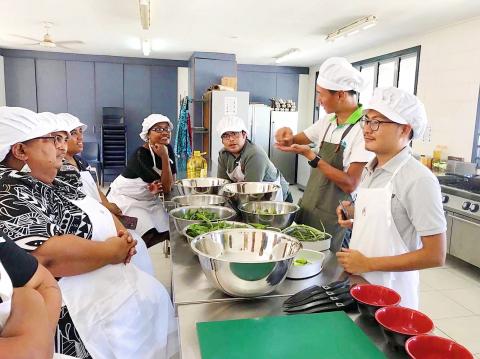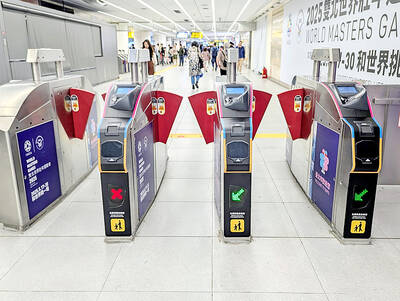The International Cooperation and Development Fund (ICDF) is promoting horticulture and pig and milkfish farming to improve nutrition in Kiribati, a diplomatic ally in the Pacific, developmental assistance team member Chen Hsiang-chi (陳翔齊) said.
The ICDF is affiliated with the Ministry of Foreign Affairs and coordinates mobile medical teams to provide free services in foreign countries as an extension of the nation’s diplomacy.
Chen, the first certified nutritionist on the ICDF’s developmental assistance teams, on July 12 said that he has been working in Kiribati since 2015 and he previously worked in Nauru with the ministry during his alternative civilian service.

Photo courtesy of Chen Hsiang-chi
Kiribati, with a population of 110,000, according to a 2015 census, is comprised of 32 atolls and reef islands, including the Tarawa atoll.
The nutritional program, which Chen supervises, aims to reduce the prevalence of noninfectious chronic diseases in Kiribati by promoting healthier diets, he said, adding that it integrates existing horticultural programs in the region from the past 10 years.
Since 2015, the team has been encouraging the cultivation and consumption of fruits and vegetables, such as Chinese cabbages, bell peppers, eggplants and beans, he said, adding that the program supplies food to six schools and a hospital.

Photo courtesy of Chen Hsiang-chi
An information and education campaign is conducted at schools and in communities to promote healthier cooking and diets, he said.
The ICDF takes part in similar efforts in Nauru, Palau and the Marshall Islands from its base in Kiribati, he said.
Last week, the organization attended the Pacific Islands Forum in Fiji to discuss broader issues of the region, with climate change looming large for its effects on food security, fisheries and sea level, he said.
The ICDF is to improve the quality of its programs and the nutritional effort is to emphasize a stronger link to local communities at the grassroots level, he said.
The fund is introducing cages at milkfish farms and adapting pig farming methods, with rising sea levels anticipated to reduce land availability, he said.

A magnitude 6.4 earthquake struck off the coast of Hualien County in eastern Taiwan at 7pm yesterday, the Central Weather Administration (CWA) said. The epicenter of the temblor was at sea, about 69.9km south of Hualien County Hall, at a depth of 30.9km, it said. There were no immediate reports of damage resulting from the quake. The earthquake’s intensity, which gauges the actual effect of a temblor, was highest in Taitung County’s Changbin Township (長濱), where it measured 5 on Taiwan’s seven-tier intensity scale. The quake also measured an intensity of 4 in Hualien, Nantou, Chiayi, Yunlin, Changhua and Miaoli counties, as well as

Credit departments of farmers’ and fishers’ associations blocked a total of more than NT$180 million (US$6.01 million) from being lost to scams last year, National Police Agency (NPA) data showed. The Agricultural Finance Agency (AFA) said last week that staff of farmers’ and fishers’ associations’ credit departments are required to implement fraud prevention measures when they serve clients at the counter. They would ask clients about personal financial management activities whenever they suspect there might be a fraud situation, and would immediately report the incident to local authorities, which would send police officers to the site to help, it said. NPA data showed

ENERGY RESILIENCE: Although Alaska is open for investments, Taiwan is sourcing its gas from the Middle East, and the sea routes carry risks, Ho Cheng-hui said US government officials’ high-profile reception of a Taiwanese representative at the Alaska Sustainable Energy Conference indicated the emergence of an Indo-Pacific energy resilience alliance, an academic said. Presidential Office Secretary-General Pan Men-an (潘孟安) attended the conference in Alaska on Thursday last week at the invitation of the US government. Pan visited oil and gas facilities with senior US officials, including US Secretary of the Interior Doug Burgum, US Secretary of Energy Chris Wright, Alaska Governor Mike Dunleavy and US Senator Daniel Sullivan. Pan attending the conference on behalf of President William Lai (賴清德) shows a significant elevation in diplomatic representation,

The Taipei MRT is to begin accepting mobile payment services in the fall, Taipei Rapid Transit Corp said on Saturday. When the company finishes the installation of new payment units at ticketing gates in October, MRT passengers can use credit cards, Apple Pay, Google Pay and Samsung Pay, the operator said. In addition, the MRT would also provide QR payment codes — which would be compatible with Line Pay, Jkopay, iPass Money, PXPay Plus, EasyWallet, iCash Pay, Taiwan Pay and Taishin Pay — to access the railway system. Currently, passengers can access the Taipei MRT by buying a single-journey token or using EasyCard,